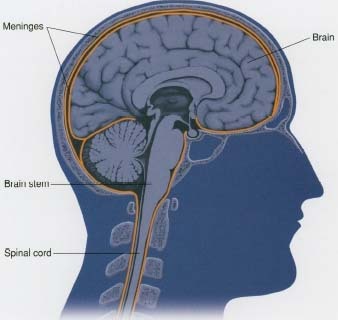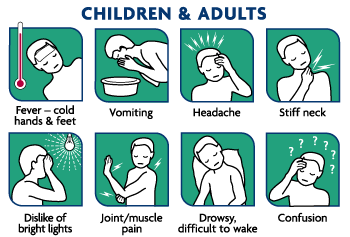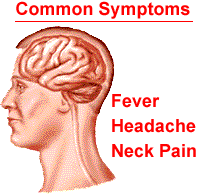


MENINGITIS WHAT TEENS NEED TO KNOW
 |
 |
 |
Meningitis can be a serious infection, and it can be contagious — which is why outbreaks make the news. However, it's also pretty rare.
What Is Meningitis?
Meningitis means inflammation of the membranes surrounding the brain and spinal cord called the meninges (pronounced: muh-nin-jeez). It often occurs when an infection elsewhere in the body spreads through the blood and into the cerebrospinal fluid (the fluid that circulates in the spaces in and around the brain and spinal cord). People can get meningitis at any age.
There are several types of meningitis, and their severity and treatment can vary depending on which type a person has. Most cases of meningitis are caused by viruses (viral meningitis) or bacteria (bacterial meningitis), but fungi and other organisms can also cause infectious meningitis. Some cases of meningitis result from head injuries, certain cancers or other diseases, or reactions to medications.
Viral meningitis is caused by such viruses as enteroviruses, which are very common in summer and early fall. These viruses can spread through contact with saliva, mucus, or feces (poop). That doesn't mean that people need to kiss or share a sandwich to catch the virus, though. People can spread the infection when they touch surfaces that others will touch or when they sneeze without covering their mouths. Enteroviruses begin to multiply in the digestive tract and can spread through the body to cause meningitis.
Bacterial meningitis is a more severe form of the infection. If it isn't treated promptly, it can cause brain damage and, in some circumstances, even death. The most common bacteria that cause bacterial meningitis in teens are Streptococcus pneumoniae and Neisseria meningitidis. People can spread them through throat and respiratory secretions — for example, by coughing or kissing. After a person is started on antibiotic treatment for meningitis, the infection can still be spread to others for at least 24 hours.
One form of bacterial meningitis is related to Lyme disease. Lyme meningitis is generally less severe than other forms of bacterial meningitis and is not fatal.
What Are the Signs and Symptoms?
Viral and bacterial meningitis can cause similar symptoms. Although it may be difficult to identify which type a person has, a doctor can often find out by doing tests.
Some symptoms of both viral and bacterial meningitis are:
If you or someone you know has these symptoms — especially if you've been around someone with meningitis — be sure to talk to a doctor. Treating the infection early is very important.
Can It Be Prevented?
Washing your hands really well and often is one way to defend against meningitis and other infections.
Although bacterial meningitis can seem scary, the chance of getting it is quite low. However, because it can be so serious, doctors now recommend that all teens get vaccinated against meningococcal meningitis (the type caused by Neisseria meningitides bacteria). Many colleges actually require their students to get meningitis vaccines. It's also sometimes recommended for people traveling to countries where meningitis is more common.
There are also vaccines for some other types of meningitis. If you have a medical condition that affects your immune system, for example, a doctor may also recommend a vaccination against the S. pneumoniae type of bacteria. But vaccines don't exist for all types of bacterial meningitis.
When to Call the Doctor
If you have meningitis symptoms, call your doctor right away. Early detection and treatment of meningitis are very important to avoid serious health problems.
If you've been in close contact with someone who has bacterial meningitis, see your doctor, even if you have no symptoms. The doctor might prescribe antibiotics to help prevent you from getting the infection. A fast diagnosis can also keep the infection from spreading to others.
What Do Doctors Do?
To diagnose meningitis, a doctor may do a spinal tap, in which a small amount of the cerebrospinal fluid is removed and tested in a lab. If the meningitis is bacterial, this can help the doctor decide which type of antibiotic to prescribe. To find out more about the infection, sometimes the doctor will also do a brain scan (called a CT scan).
Bacterial meningitis is treated in the hospital with intravenous antibiotics (through an IV — a drip that delivers the medication directly into a person's vein). Antibiotic treatment for bacterial meningitis may last for a couple of weeks, although a person may not need to spend the full time in a hospital. Lyme meningitis is also treated with IV antibiotics.
Doctors may also prescribe corticosteroids to protect a person from hearing damage as a result of bacterial meningitis. If there are problems caused by the infection, the doctor will need to treat those problems, too. Sometimes people can have permanent brain damage from the disease — especially if it is not diagnosed and treated quickly — so if you have symptoms, it's important to get checked out and treated right away.
If the meningitis is viral, it usually goes away on its own (antibiotics are not effective in treating this type of meningitis because it's not caused by bacteria). The doctor will recommend as much rest as possible to help the recovery, and also may also recommend medication to help relieve any headaches or body aches.
Reference: Kidshealth.org
Reviewed by: Larissa Hirsch, MD
Date reviewed: September 2007